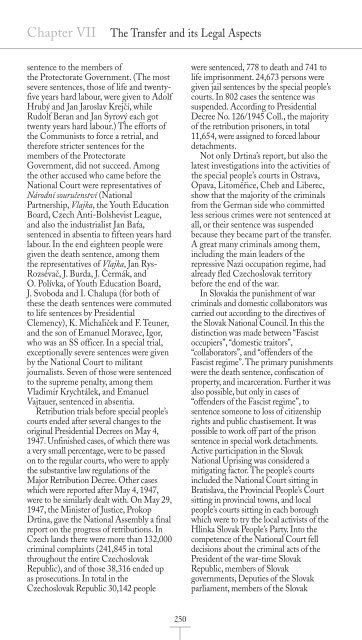the nationality of all inhabitants of the czech provinces and ...
the nationality of all inhabitants of the czech provinces and ...
the nationality of all inhabitants of the czech provinces and ...
Create successful ePaper yourself
Turn your PDF publications into a flip-book with our unique Google optimized e-Paper software.
Chapter VII The Transfer <strong>and</strong> its Legal Aspects<br />
sentence to <strong>the</strong> members <strong>of</strong><br />
<strong>the</strong> Protectorate Government. (The most<br />
severe sentences, those <strong>of</strong> life <strong>and</strong> twentyfive<br />
years hard labour, were given to Adolf<br />
Hrubý <strong>and</strong> Jan Jaroslav Krejčí, while<br />
Rudolf Beran <strong>and</strong> Jan Syrový each got<br />
twenty years hard labour.) The efforts <strong>of</strong><br />
<strong>the</strong> Communists to force a retrial, <strong>and</strong><br />
<strong>the</strong>refore stricter sentences for <strong>the</strong><br />
members <strong>of</strong> <strong>the</strong> Protectorate<br />
Government, did not succeed. Among<br />
<strong>the</strong> o<strong>the</strong>r accused who came before <strong>the</strong><br />
National Court were representatives <strong>of</strong><br />
Národní souručenství (National<br />
Partnership, Vlajka, <strong>the</strong> Youth Education<br />
Board, Czech Anti-Bolshevist League,<br />
<strong>and</strong> also <strong>the</strong> industrialist Jan Baťa,<br />
sentenced in absentia to fifteen years hard<br />
labour. In <strong>the</strong> end eighteen people were<br />
given <strong>the</strong> death sentence, among <strong>the</strong>m<br />
<strong>the</strong> representatives <strong>of</strong> Vlajka, Jan Rys-<br />
Rozsévač, J. Burda, J. Čermák, <strong>and</strong><br />
O. Polívka, <strong>of</strong> Youth Education Board,<br />
J. Svoboda <strong>and</strong> I. Chalupa (for both <strong>of</strong><br />
<strong>the</strong>se <strong>the</strong> death sentences were commuted<br />
to life sentences by Presidential<br />
Clemency), K. Michaliček <strong>and</strong> F. Teuner,<br />
<strong>and</strong> <strong>the</strong> son <strong>of</strong> Emanuel Moravec, Igor,<br />
who was an SS <strong>of</strong>ficer. In a special trial,<br />
exception<strong>all</strong>y severe sentences were given<br />
by <strong>the</strong> National Court to militant<br />
journalists. Seven <strong>of</strong> those were sentenced<br />
to <strong>the</strong> supreme penalty, among <strong>the</strong>m<br />
Vladimír Krychtálek, <strong>and</strong> Emanuel<br />
Vajtauer, sentenced in absentia.<br />
Retribution trials before special people’s<br />
courts ended after several changes to <strong>the</strong><br />
original Presidential Decrees on May 4,<br />
1947. Unfinished cases, <strong>of</strong> which <strong>the</strong>re was<br />
a very sm<strong>all</strong> percentage, were to be passed<br />
on to <strong>the</strong> regular courts, who were to apply<br />
<strong>the</strong> substantive law regulations <strong>of</strong> <strong>the</strong><br />
Major Retribution Decree. O<strong>the</strong>r cases<br />
which were reported after May 4, 1947,<br />
were to be similarly dealt with. On May 29,<br />
1947, <strong>the</strong> Minister <strong>of</strong> Justice, Prokop<br />
Drtina, gave <strong>the</strong> National Assembly a final<br />
report on <strong>the</strong> progress <strong>of</strong> retributions. In<br />
Czech l<strong>and</strong>s <strong>the</strong>re were more than 132,000<br />
criminal complaints (241,845 in total<br />
throughout <strong>the</strong> entire Czechoslovak<br />
Republic), <strong>and</strong> <strong>of</strong> those 38,316 ended up<br />
as prosecutions. In total in <strong>the</strong><br />
Czechoslovak Republic 30,142 people<br />
250<br />
were sentenced, 778 to death <strong>and</strong> 741 to<br />
life imprisonment. 24,673 persons were<br />
given jail sentences by <strong>the</strong> special people’s<br />
courts. In 802 cases <strong>the</strong> sentence was<br />
suspended. According to Presidential<br />
Decree No. 126/1945 Coll., <strong>the</strong> majority<br />
<strong>of</strong> <strong>the</strong> retribution prisoners, in total<br />
11,654, were assigned to forced labour<br />
detachments.<br />
Not only Drtina’s report, but also <strong>the</strong><br />
latest investigations into <strong>the</strong> activities <strong>of</strong><br />
<strong>the</strong> special people’s courts in Ostrava,<br />
Opava, Litoměřice, Cheb <strong>and</strong> Liberec,<br />
show that <strong>the</strong> majority <strong>of</strong> <strong>the</strong> criminals<br />
from <strong>the</strong> German side who committed<br />
less serious crimes were not sentenced at<br />
<strong>all</strong>, or <strong>the</strong>ir sentence was suspended<br />
because <strong>the</strong>y became part <strong>of</strong> <strong>the</strong> transfer.<br />
A great many criminals among <strong>the</strong>m,<br />
including <strong>the</strong> main leaders <strong>of</strong> <strong>the</strong><br />
repressive Nazi occupation regime, had<br />
already fled Czechoslovak territory<br />
before <strong>the</strong> end <strong>of</strong> <strong>the</strong> war.<br />
In Slovakia <strong>the</strong> punishment <strong>of</strong> war<br />
criminals <strong>and</strong> domestic collaborators was<br />
carried out according to <strong>the</strong> directives <strong>of</strong><br />
<strong>the</strong> Slovak National Council. In this <strong>the</strong><br />
distinction was made between “Fascist<br />
occupiers”, “domestic traitors”,<br />
“collaborators”, <strong>and</strong> “<strong>of</strong>fenders <strong>of</strong> <strong>the</strong><br />
Fascist regime”. The primary punishments<br />
were <strong>the</strong> death sentence, confiscation <strong>of</strong><br />
property, <strong>and</strong> incarceration. Fur<strong>the</strong>r it was<br />
also possible, but only in cases <strong>of</strong><br />
“<strong>of</strong>fenders <strong>of</strong> <strong>the</strong> Fascist regime”, to<br />
sentence someone to loss <strong>of</strong> citizenship<br />
rights <strong>and</strong> public chastisement. It was<br />
possible to work <strong>of</strong>f part <strong>of</strong> <strong>the</strong> prison<br />
sentence in special work detachments.<br />
Active participation in <strong>the</strong> Slovak<br />
National Uprising was considered a<br />
mitigating factor. The people’s courts<br />
included <strong>the</strong> National Court sitting in<br />
Bratislava, <strong>the</strong> Provincial People’s Court<br />
sitting in provincial towns, <strong>and</strong> local<br />
people’s courts sitting in each borough<br />
which were to try <strong>the</strong> local activists <strong>of</strong> <strong>the</strong><br />
Hlinka Slovak People’s Party. Into <strong>the</strong><br />
competence <strong>of</strong> <strong>the</strong> National Court fell<br />
decisions about <strong>the</strong> criminal acts <strong>of</strong> <strong>the</strong><br />
President <strong>of</strong> <strong>the</strong> war-time Slovak<br />
Republic, members <strong>of</strong> Slovak<br />
governments, Deputies <strong>of</strong> <strong>the</strong> Slovak<br />
parliament, members <strong>of</strong> <strong>the</strong> Slovak


